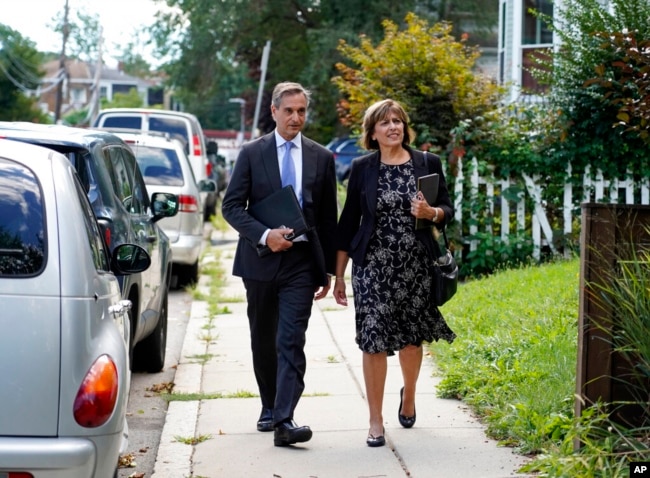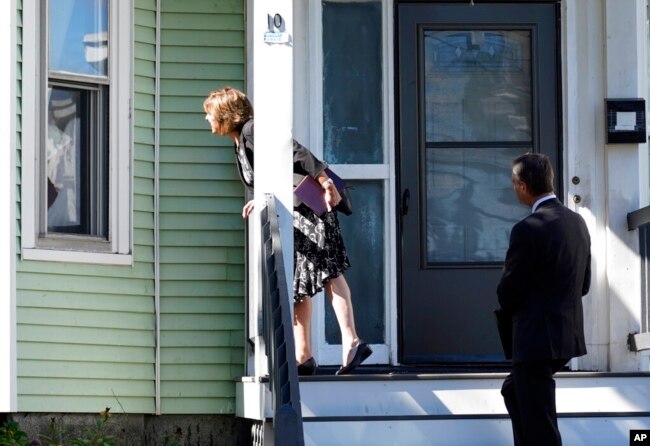After a more than two and a half year hiatus caused by the coronavirus pandemic, Jehovah’s Witnesses have resumed their door-to-door ministry in the United States, restoring a religious activity that the faith values and considers essential.
For the first time since March 2020, members of the Christian faith spread out across the country on Thursday in cities and towns to distribute literature and have religious discussions.
Dan and Carrie Sideris spent a warm morning going door-to-door and ringing bells in the Jamaica Plain neighborhood on the south side of Boston. Dan Sideris claimed that the encounter dispelled whatever uncertainty he had about personally preaching in “a transformed society.”
“It all came back quite naturally because we don’t have a canned speech,” he said. “We try to engage with people about what’s in their heart, and what we say comes from our hearts.”
The couple was taken aback by how many people showed up and were welcoming.
A man took a break from a Zoom call to receive their pamphlets and schedule a time to talk more. The Siderises could identify with the woman who described how many family members had passed away in the last two years at another house because they had both just lost parents. However, she spoke to Carrie Sideris through the glass and told her she could return on Sunday even if she was now too busy.

“I’ve been looking forward to this day,” she said. “When I rang the first doorbell this morning, a total calm came over me. I was back where I needed to be.”
In the early stages of the pandemic’s arrival in the United States, Jehovah’s Witnesses stopped knocking on doors, just as a large portion of the rest of society also went into lockdown. A record-breaking action that was not taken even during the Spanish flu pandemic in 1918, which claimed the lives of 50 million people globally, the organization also terminated all public meetings at its 13,000 congregations across the country and canceled 5,600 annual gatherings around the world.
According to Robert Hendriks, the denomination’s national spokesperson, the Witnesses continued their ministry by sending letters and making phone calls, but it wasn’t the same because it lacked a personal touch.
“To us, going door to door is an expression of our God’s impartiality,” he said. “We go to everyone and let them choose whether they want to hear us or not.”
Even before the epidemic, door-to-door outreach was fraught with uncertainty for the Witnesses since they never knew how they would be accepted at any given home. Evangelists are encouraged to keep in mind that lives and attitudes have changed in 2022 because this will be the case much more.
Hendriks remarked that “an additional level of daring” would be required.
The group does not require masks or social seclusion; it leaves those options up to each person.
In April, the organization reopened congregations for in-person meetings. In June, it began its public ministry program, in which members set up carts in public spaces like subway stations and distribute literature.
But getting back to door-knocking, considered not just a core belief but also an effective ministry, is a big step toward “a return to normal,” Hendriks said.

Among those eager to pound the pavement again was Jonathan Gomas of Milwaukee, who started door-knocking with his parents when he was “big enough to ring a doorbell.”
“When you’re out in the community, you have your hand on the pulse,” he said. “We haven’t had that close feeling with the community for more than two years now. It feels like we’ve all become more distant and polarized.”
Gomas and his wife and two daughters have all learned Hmong in order to better reach out to members of that community, and residents are often pleasantly surprised to open their doors to fluent speakers of their language
“I think it made them listen even closer,” he said.
‘Much more personal’
Nathan Rivera of Acworth, Georgia, claimed that he has sorely missed reading people’s facial expressions and seeing their faces.
“You see and appreciate these responses, and it’s much more personal,” he said. “You establish common ground and relationships that you can never develop over the phone or by writing a letter.”
Rivera, whose parents were Cuban refugees who immigrated to the country in the 1980s, claimed that door-to-door soliciting is a significant aspect of his spiritual identity and “feels Christ-like.”
“We show respect for each person’s right to hold a different belief,” he said. “If they don’t want to hear what we have to say, we politely thank them and move on, recognizing that we cannot judge anyone. We’ll just keep on knocking.”
The source used in the creation of a news story: https://www.voanews.com

